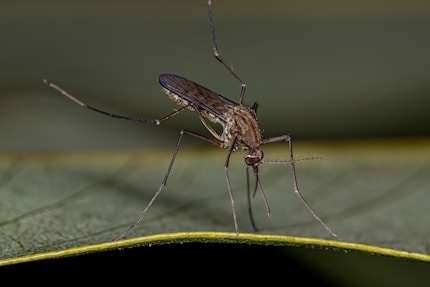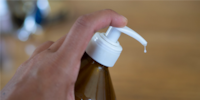

Why do mosquitos prefer biting certain people?
Mosquitos are picky when it comes to choosing their victims. Not everybody is quite to their taste. The reason? It’s mostly because of bacteria.
Bssss... bsss... bssss. It’s twilight and I’m sitting on the balcony, glass of rosé in hand. Bssss... bsss... bssss. I glance nervously this way and that, trying to find the source of the unpleasant noise. Thirty seconds later, however, I feel it: I’ve just been bitten by a mosquito. My buddy continues sitting opposite me without a care in the world while the critters zero in on me alone.
But why?
Several factors influence a mosquito’s choice of prey
There are currently 3,603 different species of mosquito known worldwide, though only a small fraction of them are of any consequence to humans due to their ability to transmit disease. In Switzerland, there are actually just a few dozen different species. Whether they actually end up landing on your skin depends on a number of factors, as Dr Stefan Ungricht, entomologist and Vice President of the Naturforschenden Gesellschaft in Zürich (Society of Natural Sciences Zurich) explains.
«At long distances, the increased carbon dioxide content in the air we breathe out plays a role. Of course, we don’t have any control over that – it’s not as if stopping breathing is an option.» Should the insects come closer, the way we smell becomes important. «How appetising we are to mosquitos varies depending on body odour and the use of skincare products.» Dr Niels Verhulst from the Institute of Parasitology at the University of Zurich says: «Body odour is largely produced by bacteria on our skin. A person appears more or less attractive to mosquitos depending on the combination of these bacteria.»

Source: Vinicius R. Souza / Shutterstock
When mosquitos get up close, our body heat and to some extent their sight come into play. «Dark clothing especially attracts attention from mosquitos», says Ungricht. Clothing, however, is often a secondary factor because most mosquitos strike at night when visual cues are difficult to perceive, Verhulst adds. Contrary to popular belief, having the window open with the light on doesn’t make a difference – something my colleague Katja has already touched on in her summer fact check. Ungricht adds: «In our European climes, light is far more likely to draw midges, crane flies and daddy long legs than mosquitos. None of these would suck blood, though people often confuse them with mosquitos.»
Keep your eyes peeled when choosing a partner
Once the mosquitos are on your skin, sensors in their feet and at the tip of their complex proboscis lead them towards a suitable blood vessel. By the way, only the females suck blood. It’s how they get the protein necessary for maturing their own eggs. When it comes to sustenance, mosquitos of both sexes rely on nectar and other sweet plant juices.
The make-up of the bacteria on your skin, however, determines whether or not you’ll be bitten long before it happens. Nets and mosquito sprays can help to prevent this from happening to you (as much) in the future. «They should contain DEET, picaridin, IR3535 or para-menthane diol. Natural sprays, unfortunately, don’t help as much», says Verhulst. But what’s the failsafe solution? «Find yourself a partner who’s more attractive to mosquitos.» From now on, all my first dates are going to be evenings at the lake. Bssss... bsss... bssss.
Why does the hand of a station clock usually stop short? Why do they serve popcorn at the movies? And why is glass not allowed with other waste? There are plenty of puzzles in store for us in everyday life; and occasionally, I try to solve them. If you have a burning question but no time to research it, send it to me by e-mail. I’m happy to do the dirty work.
My life in a nutshell? On a quest to broaden my horizon. I love discovering and learning new skills and I see a chance to experience something new in everything – be it travelling, reading, cooking, movies or DIY.
Practical solutions for everyday problems with technology, household hacks and much more.
Show all



